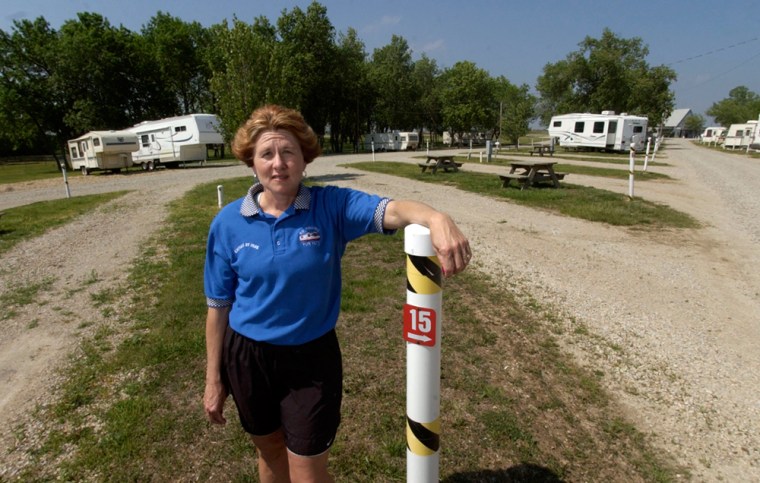Charlotte Pinick takes a quick inventory: Five recreational vehicles parked in a nearby truck stop parking lot; a few more up the road at the Wal-Mart.
That's more than $120 the owner of Emporia RV Park won't be bringing in this day as travelers choose free parking over the campsites with water, electricity, dump station and wireless Internet service Pinick and her husband are offering for $22.50 a night.
"We don't like it, but it's one of those things," Pinick says of the RVs that could have been filling the 20-some empty spaces in her RV park.
With $2 gas prices making their hobby more expensive, RV enthusiasts are trimming their travel costs any way they can, whether it's taking fewer and shorter trips or spending a few nights in the local Wal-Mart parking lot, experts say.
They're also looking for convenience, security and familiarity as they drive their travel trailers or $100,000-plus motor homes from one end of the country to the other.
"There are those nights when you're forced to drive in the dark to find someplace to park and you just don't know what you're going to find," said Chuck Woodbury, who publishes RV-related articles on the Internet. "You say to yourself, 'There's a Wal-Mart over there. I'm going to make life easy for myself.'"
Woodbury operates what he calls the largest book store exclusively focused on recreational vehicles. Among the offerings on rvbookstore.com is a publication that lists all the Wal-Marts where overnight parking is not allowed, and a Wal-Mart locater guide, complete with maps to every Wal-Mart store in the country except those in Hawaii.
Those are a must-have for serious RVers, he said.
"Boondocking," also known as primitive camping, is the RVer term for camping without the use of such conveniences as electricity and water. The subject, especially as it pertains to Wal-Mart lots, is a favorite topic among Internet-savvy travelers on such sites as freecamping.com, fulltimerver.com and Woodbury's rvtravel.com.
There has even been a documentary about parking in Wal-Mart lots, titled "This is Nowhere," which includes interviews with RVers in Missoula, Mont.
"We took it on because we're interested in the contradiction between wanting to experience nature and experience the cultures and history in various regions of the United States," filmmaker Doug Hawes-Davis said of the documentary. "A lot of them (campers) recognize some of the contradictions and absurdities of camping at a Wal-Mart. Even RVers themselves don't deny it."
Critics of the practice — especially campground owners who feel they are losing money because of it — argue that people who can afford to drive vehicles worth hundreds of thousands of dollars across the country surely can afford to pay the $20 or $30 nightly fee for a campsite.
But RVers say it's not always about saving money. Most Wal-Marts are easy to find, the lots are lit up at night and usually have security cameras. Campers can restock their supplies, get something to eat and be back on the highway with ease — which is important to people who have someplace else to be.
Pinick, the campground owner, said most transient campers she sees — the ones who are just passing through, rather than the "snowbirds" who park there for extended stays — alternate between parking in campgrounds and overnighting in places where they don't have to pay.
"Most people are every other day," Pinick said. "If there's a Wal-Mart, they'll stay there one night, and the next come to places like this and get water and dump their tanks. That's kind of a general consensus."
Wal-Mart spokeswoman Christi Gallagher said there are 3,167 Wal-Marts and Sam's Club stores scattered across the U.S. in communities of all sizes. The company whose founder, Sam Walton, was said to be an RV enthusiast, encourages RVers to park in its lots wherever it's allowed, she said.
"From Wal-Mart's perspective, RVers are customers and we're certainly happy to host them in our parking lot when we can," she said.
Yuma, Ariz., is one of those places where overnighting at Wal-Mart is not allowed. Richard Fuller found that out the hard way.
"I've only had one problem with parking at Wal-Mart," said Fuller, of Mesa, Ariz., as he loaded bottled water into a motor home in the Wal-Mart parking lot in Emporia, Kan. "I pulled in around 10 o'clock at night. There were other RVs there, but in the middle of the night, a cop knocked on our door and said we couldn't park there."
James Stover, public affairs manager in Yuma, said the city has a 20-year-old ban on any overnight camping without a permit. Campgrounds are big business in Arizona, he said, and allowing travelers to camp overnight for free does not help the business community.
Woodbury said that's not uncommon in places where the weather is nice year-round.
"If you look, the areas where staying at Wal-Mart is not allowed are generally places like Florida, Arizona, Southern California, where you get winter snowbirds who would go in and occupy parking lots and there would be no room for cars," he said. "Also, there are small towns where campground owners go to the city council and say it's hurting their business."
In Jamestown, N.D., campground owners pushed the city government to ban parking in the Wal-Mart lot earlier this year, but the issue was dropped when local residents argued against it.
"It got pretty lively, particularly in the articles in the newspaper," said James Fuchs, city administrator. "There were opinion articles from citizens who said they wanted to leave things as they were."
